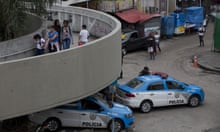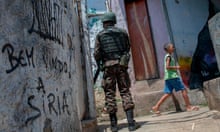When I published my first article in the Guardian in August 2015, I warned readers that Rio de Janeiro was not ready for another mega-event. Two months after the 2016 Games, the state government of Rio de Janeiro announced a set of measures to balance the public accounts. According to the governor, Luiz Fernando Pezão, if the measures are not implemented, the state will have a deficit of 52bn reais ($15.3bn) by December of 2018. People here believe that public cuts will hit the poorest social classes and public workers hardest.
The situation of instability due to mismanagement and corruption in Rio de Janeiro haunts the lives of thousands of people, mainly those who live in favelas. In Rocinha, we have not spoken about the Olympic Games for months. Construction projects promised under the Growth Acceleration Programme, which were funded by the federal government and should have been delivered in 2013, have not been completed. Because of the delay, the residents of Rocinha decided to sue the construction companies responsible on suspicion of corruption.
The severity of the crisis is a reflection of the alleged political irregularities committed since 2007 by former governor Sérgio Cabral Filho. Earlier this month, he was arrested by the federal police – federal prosecutors accuse him of leading a criminal organisation that took bribes from construction firms in exchange for awarding them infrastructure contracts between 2007-2014.
Since the end of the Games, there have been no reports of any armed confrontation in Rocinha. However, the police pacification unit (UPP) continues to operate in the area. In October, the head of the public security policies, José Mariano Beltrame, resigned as Secretary of Public Security in the state of Rio de Janeiro. This act demonstrates the lack of efficient management in the creation of public policies for the social development of favelas. Because of this, the UPP project has not been successful.
Rocinha Park’s C4 Library is threatened with closure – a cultural provision that had been requested for many years by residents and cultural leaders. According to the Institute for Development and Management (IDG) – the entity responsible for administration of the library – the state government has not been transferring the funds needed to maintain a space that is used by thousands of children, young people and adults in the community. The deadlock also affects libraries in Manguinhos, Niteroi and the city centre. In Rocinha, the library is one of the few cultural spaces that encourages reading, as well as audiovisual and leisure activities, and provides internet access.
In October of this year, municipal elections were held in Rio de Janeiro. Bishop Marcelo Crivella defeated left-wing candidate Marcelo Freixo in the second round of elections. The hope is that the newly elected mayor treats the maintenance of libraries as a priority of government. Culture is the best way to prevent violence in vulnerable areas.
Construction of the subway extension has been completed and Rocinha now has a station on Line 4, but it bears the name of the nearby luxury neighbourhood, São Conrado. The station is being used by thousands of people every week, to various destinations. However, the court of auditors of Rio de Janeiro (TCE) has released a report indicating that there has been over-invoicing in the construction of the subway extension. In Rocinha, the city hall has inaugurated a school with seven classrooms, a library with computers, and a covered patio, among other areas. From 2017, the space will provide schooling for 225 children. The school was named after Luiz Paulo Horta, a columnist for O Globo newspaper. Its construction had been a demand of the Rocinha Residents’ Association since 2013 and was celebrated by the community, as many children lack access to education because there aren’t enough school places.
With the end of the Olympic Games, the favela has returned to its former status as an invisible space. The hope remains high of new construction works that will improve the lives of residents, but we don’t yet know when the worst of the financial crisis will pass.
We hope that the next host city of the Olympic Games will not make the same mistake as Rio de Janeiro: a lack of dialogue with its people.








